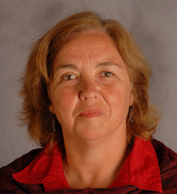FAITH + IDEAS =: last updated 01/13/2009
January 7, 2009 Volume 2 Issue 1
. . . an e-conversation with the Faculty of Gordon College . . .
By Judith Oleson
In working with social work majors in their senior field placements, I've observed a lot. Many students encounter, some for the first time, clients and co-workers, supervisors and community activists, politicians and policy analysts who hold different beliefs, values and worldviews from their own. Sometimes "difference" is across racial, class or cultural lines. And sometimes "the other" is anyone whose life choices are different. Consequently students need to practice what the social work program has already taught them: to embrace and respect all persons even though they might represent "those other people."
But how? How can they--and the rest of us-resolve ourselves to a year of embracing and respecting others, no matter the diversity? Put another way, how can we live reconciled? Especially at the start of a new year and in the midst of so many crises that might tempt us to push people away rather than embrace them, what steps can we take toward peace?
First, let's identify the problem. Though 2009 is both bitter and sweet--we're inaugurating a president who seems willing to listen to diverse viewpoints but is inheriting an economic disaster--we have to acknowledge the mess we're in. We have an economic system built on consumerism that has required we spend rather than save. The failure of major financial institutions has frozen credit here and around the world, causing state governments, private companies and educational institutions to cut staff and services. We have not seen the worst of it, and unfortunately, those already at risk will suffer the most. The impact on a range of people here and throughout the world is already great.
Second, let's admit what went wrong. I happen to believe that our financial systems have been allowed to over-extend themselves through unreasonably risky products bearing great profits, with virtually no government oversight. Instead of making loans for production, our financial institutions now primarily buy and sell debt for a profit. Predatory lenders have provided home mortgages to people they knew could not afford to pay. And our government borrows from other countries to fund the Iraq war, while paying many U.S. companies lucrative profits for military support services and to build Iraq's infrastructure that we tore down. This process has strained relationships around the globe.
Third, let's acknowledge that a creative solution is possible, but it won't be easy. Reconciliation never is, after all. Still, we can reconcile our own lives with God's plan for us and at the same time, rethink the over-consumption that too often drives our priorities. We can seek forgiveness for engaging with institutions that maximize profits for a few at the expense of many. We can no longer ignore our participation in a culture of exploitation, and can choose not to support a religious culture that promotes a gospel of "prosperity." Finally, we can see the opportunity we have now to reconcile our day-to-day habits with a life of stewardship, not only in our fiscal habits but in our relationship to the Earth, knowing as we do, everyone around us is affected for the good.
For those of us who call ourselves Christians, we have an opportunity to model life as reconciled community in the way St. Francis prayed, "to give more than we receive." We are invited to turn over all that worries us and alienates us from others and prayerfully move into a deeper level of trust. Only then can our eyes see new opportunities for giving and sharing with those around us, even those with whom we disagree.
In entering 2009, we can resolve to be reconciled to God, to each other, and to institutions that resist exploitation and greed. We can model a new economy by organizing shared housing, offering no-interest loans, establishing labor exchanges, creating cooperative health plans, or growing community gardens. This New Year, more than any new year in the recent past, is the time to reconcile our lifestyles to the Prince of Peace, to decrease our wants and fears in order to create more space for others.
As I prepare to help our social work students this year, I'm certainly aware of the challenges they'll face. But I also believe we have the capacity to prepare Christian leaders who can effectively contribute to the public square, without the need to condemn and diminish those with diverse points of view. That can only happen of course as each of us takes intentional steps toward peace.
Judith Oleson is an associate professor of social work. She lives in Rockport, MA, and has two daughters.
